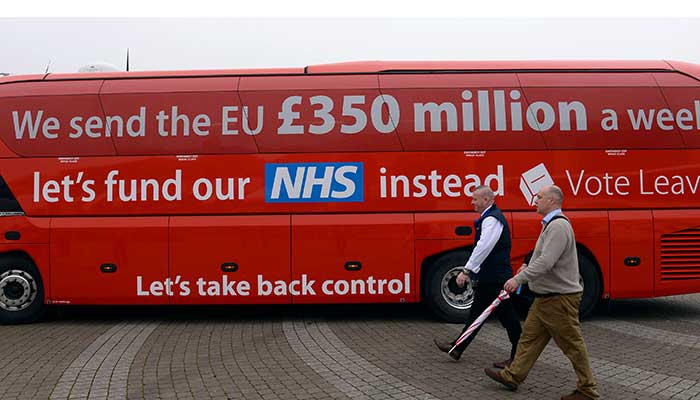
Photo: PA
The past 12 months have been like no other for the health service. NHS trusts have pulled out every stop to try and maintain A&E and waiting time targets day in, day out, meet record levels of demand and turn around an almost £3bn deficit. To add to this already formidable task, the NHS has spent the year developing major plans to fundamentally transform local health and care services. It’s little wonder that in this context, and given the glacial pace at which our understanding of what the EU referendum outcome really means has advanced, Brexit hasn’t been at the top of the NHS’s priority list.
But the recent agreement struck in Parliament – sight of the government’s negotiating plan before withdrawal commences in return for a commitment to respect the March 2017 deadline for the triggering of Article 50 – has put a rocket under Brexit. Against this increasingly concrete timetable, this Wednesday will mark 100 days until negotiations get underway. If the NHS is to register as a key consideration in Brexit negotiations when pitted against muscular and already mobilised areas such as agriculture, manufacturing and financial services, the health sector needs to get into fighting form, and fast.
Ideally poised to kick-start this process is the new Commons health committee’s inquiry on Brexit’s impact on health and social care. NHS Providers evidence highlights these as potentially far reaching, and both positive and negative, although until key parts of the puzzle are in place – whether the UK will seek to remain in the single market, for instance – nobody can say for sure which will materialise. As the government prepares for negotiations in early 2017, there are four major issues that stand out as priorities for the NHS.
NHS funding will have to rise to meet demand, regardless of the economic fluctuations that may lie ahead
‘A strong NHS needs a strong economy’ stands out as one of the more durable mantras of the Cameron era, perhaps as there’s no denying the intrinsic relationship between economic performance and public service finances. To suggest that the economic impact of Brexit will have a knock on effect on the NHS is therefore uncontroversial.
It is, however, not the positive one that the Leave campaign promised during the referendum campaign. Few, if any, now seriously believe that Brexit will mean a weekly windfall of £350m for the NHS. Indeed, November’s Autumn Statement served to confirm the government’s business-as-usual approach to health funding, with no more money bound for the Department of Health coffers to 2020, beyond what’s already been promised.
This decision means that that years between now and then will bring challenges that the health service has never faced before. The NHS is already working hard to meet those challenges head on. But by the time the UK withdraws from the EU, assuming that this is in 2019, the NHS will be a year shy of a decade-long financial squeeze that in practical terms means that health spending per head will only have increased by just 0.1% every year between 2009/10 and 2020/21.
De facto flat lining health spending cannot continue indefinitely; the combined forces of our ageing population and aspirations to remain a world-class health system won’t allow it. As Brexit is negotiated, the need for NHS funding to begin rising again in line with demand must therefore be at the forefront of the government’s mind – NHS funding was an issue for pro-Remain and pro-Leave camps alike.
Workforce shortages are a very real problem; Brexit must not make them worse
The financial pressures facing the NHS make near-daily headlines but as we revealed in our State of the NHS Provider Sector report – the largest ever survey of NHS chairs and chief executives – it’s now workforce shortages that are keeping NHS leaders awake at night. In the context of persistent shortages, just one in four trust leaders (27%) are confident they have the right staff numbers, and quality and skill mix, to deliver high quality healthcare for patients and service users.
Into an already strained situation, Brexit has added another level of uncertainty. An estimated 167,500 EU nationals currently work in the health and social care sectors in England. The vast majority do not have UK citizenship or indefinite leave to remain, and so do not know what will happen to their right to work and reside in the UK following Brexit.
NHS providers value and rely on staff from all over the world, from Ipswich to Italy to Indonesia. Each makes a vital contribution the collective endeavour of providing care, support and compassion to people at their most vulnerable. Work undertaken by the Centre for Workforce Intelligence demonstrates that over the next 13 years, demographic change will increase the size and diversity of the UK’s health and social care workforce. Armed with this foresight, and with domestic supply unable to meet even current levels of need, it’s clear that the NHS and social care system need to continue to be able to recruit staff with the right skills from abroad as well as at home.
That’s why NHS Providers is a founding member of the Cavendish Coalition, a collective of 31 health and social care organisations which have come together to campaign for EU nationals currently working in the health and social care system to be given indefinite leave to remain and to ensure that the system can still recruit from the largest possible pool after Brexit.
Reforming competition and procurement rules: the silver lining?
The challenges for the NHS associated with Brexit are currently clearer than the opportunities, but the latter do exist. Even before the referendum, an NHS Providers survey highlighted NHS competition law and procurement as the areas on which a significant majority of participating NHS leaders suggested they thought Brexit would impact most positively.
A complex patchwork of EU regulations and domestic law sets out the competition framework in which the NHS operates. Through this, NHS trusts are required to follow a range of EU-wide competition and procurement processes to ensure NHS services put out to tender are advertised fairly and are accessible to a wide range of potential providers. Application of these rules can, in practice, be time consuming and, as they are not tailored to the unique arrangement of the NHS, they can also be disproportionate. Essentially, many are regarded as dreaded ‘red tape’.
Depending on the nature of future relationship the government negotiates with the EU, Brexit could change this. The UK’s withdrawal from the EU comes at a time when collaborative ways of working across health and social care are widely recognised as the best chance the NHS has to achieve long-term sustainability. Following the passage of the Great Repeal Bill, Brexit may create an important opportunity to review the application of competition and procurement policy within the NHS. This could allow for easier collaboration and a proportionate approach to procurement and competition, which would likely be welcomed with open arms by a health and care system currently working to pull together services and increase efficiencies against the odds.
Medical research, development and innovation: preserving the jewel in the UK crown
The NHS has been at the forefront of some of the most important advances in treatment, medical innovation and clinical research of the past 68 years. In recent decades, its reputation as an international leader in these fields has been enhanced by, and become closely entwined with, the UK’s relationship with the EU.
It is through EU membership, for instance, that the UK is a net beneficiary of EU research funds – the Academy of Medical Royal Colleges estimates that between 2007 and 2013, the UK received £8.8bn of funding from the EU research budget compared to its contribution of £5.4bn. Additionally, shared arrangements around data protection and clinical trials offer NHS patients the opportunity to participate in multinational clinical trials.
That the chancellor has committed to back those EU-funded projects to 2020 that were signed off before the Autumn Statement, including funding for universities and researchers, is both welcome and an endorsement of their importance. But this solution is temporary. If a modern and ambitious industrial strategy is to propel the UK into a positive post-Brexit future, then a central pillar must surely be maintaining the NHS’s world leading status in medical research and development. The benefits of involvement in the EU’s research ecology must not be lost.
At NHS Providers, Brexit is very much on our radar. It is already clear there will be both risks and opportunities and that the health sector must be alert to defend against any negative impact and sufficiently fleet of foot to seize opportunities as they emerge. As we enter 2017, it’s now vital that a clear understanding of the relationship between Brexit and the NHS is established, from patients, staff and local NHS leaders all the way up to Number 10. We are committed to working collaboratively with stakeholders across the heath and social care sector to achieve this outcome and ensure that, by the time Article 50 is triggered, the NHS is firmly on the Brexit radar too.




















